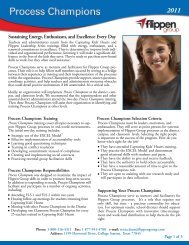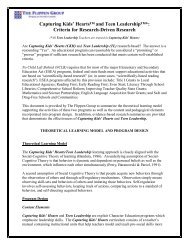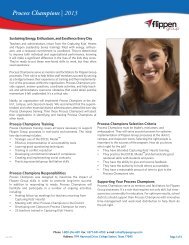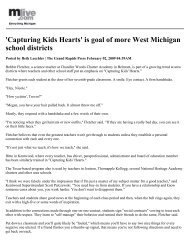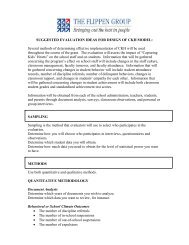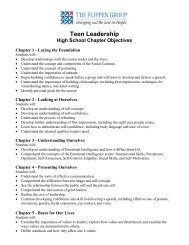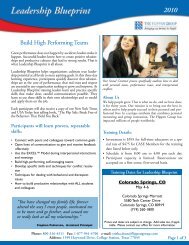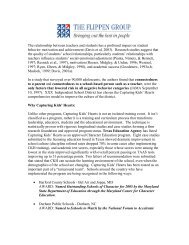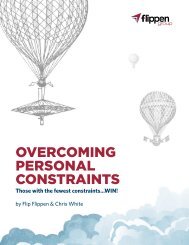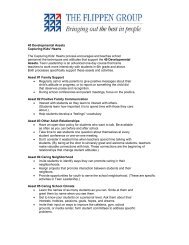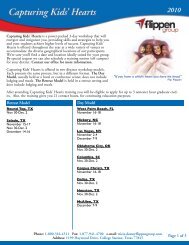Smart & Good High Schools - The Flippen Group
Smart & Good High Schools - The Flippen Group
Smart & Good High Schools - The Flippen Group
- No tags were found...
Create successful ePaper yourself
Turn your PDF publications into a flip-book with our unique Google optimized e-Paper software.
CHAPTER 4: <strong>The</strong> Professional Ethical Learning Communitycommunity among staff that models and promotes strongperformance character (work ethic, diligence, perseverance)is one of the primary ways we enable students tofeel genuinely loved. And that staff commitment to excellence,in turn, translates into increased levels of studentengagement and achievement.<strong>The</strong> Courage to TeachIn <strong>The</strong> Courage to Teach, Parker Palmer shows how the ethicaland excellence dimensions of teaching are intertwined.He argues that there are at least three reasonsthat teaching well is so difficult: (1) the subjects we teachare complex, and we struggle to capture and convey theirtrue complexity; (2) students are complex, and interactingwith them wisely and well is very difficult; and (3) weteach who we are. Palmer writes:Every class comes down to this: my students and I, face toface, engaged in an ancient and exacting exchange callededucation. <strong>The</strong> techniques I have mastered do not disappear,but neither do they suffice. With my students, only oneresource is at my immediate command: my identity, my selfhood,my sense of ‘I’ who teaches—without which I have nosense of the ‘Thou’ who learns. 5If, as Palmer argues, the self is central in teaching, thenthe teacher’s character—the kind of human being theteacher is—takes on great importance. In his book, Teachingas a Moral Craft, Alan Tom makes a similar point:Teaching is a moral act. 6 Teaching expresses our dedicationto our craft, or the lack of it; it affects students’learning and welfare, for good or for ill.Teaching is a moral act.In short, excellence in teaching is not simply a vocationalnorm to aspire to; it is an ethical norm to which we mustadhere. To be less than one’s best is a moral breakdown, violatingwhat one school administrator referred to as the“silent handshake” between teachers and students. <strong>The</strong>silent handshake is an unspoken moral compact, a fundamentalbelief by students and their families that studentswill be not only physically and emotionally safe, but thatteachers will be well-trained in their profession and preparedto teach their course material well, that they willsend students away from the course of study well-preparedas judged by some commonly held standard ofexcellence.<strong>The</strong> Students Are WatchingIn their book <strong>The</strong> Students are Watching, Ted and NancySizer remind us of what we all know but sometimes forget:Students constantly watch how adults behave. 7 <strong>The</strong>yobserve how committed we are to excellence and ethics.Adolescents observe especially keenly. In the mind of ateenager, few things are worse than hypocrisy: preachingone thing and practicing another.In school, students are watching how adults prepare andexecute their professional responsibilities; how adultshandle moral issues in the life of the classroom and in thelife of the school; how adults treat one another. <strong>The</strong>y arewatching to see if adults are engaged in their own journeyof learning and development.This may well be where schools that merely “educate” areseparated from what Gerald Grant calls “schools thatimprint.” 8 Educators who imprint leave a lasting mark onthe character of their students because they practice a“do as I say and do” philosophy. Love history, as I do; doyour work well, as I do; demonstrate integrity in your relationships,as I do. Such educators live out the Quakermaxim: “Let your life speak.”We teach who we are.In short, adults must pass the “Holden Caulfield test” 9 ;they must show students that all adults are not phonies,espousing a set of standards they themselves are not willingto apply to their own lives. In the words of oneteacher, “You cannot teach where you do not go.” Studentswill care about and pursue their best self when thatis the norm for every member of the school community,including adults.We turn now to promising practices that illustrate the sixprinciples of the ethical learning community as they playout in the PELC. PELC takes the six principles thatdefined the ELC—developing shared purpose, aligningpractices with outcomes and research, maximizing thevoice of ELC members, striving for continuous personaldevelopment, practicing collective responsibility, andgrappling with the difficult issues—and applies them tothe collegial functioning of faculty and staff.<strong>The</strong> importance of building a positive staff culturearound principles such as these cannot be overstated.Comments one leading character educator and consultantto schools: “Staff culture is crucial. In working with aschool, it’s every bit as important as classroom pedagogy.”63<strong>Smart</strong> & <strong>Good</strong> <strong>High</strong> <strong>Schools</strong>



